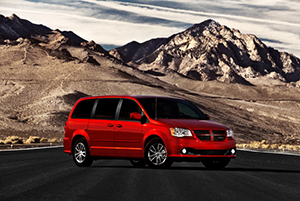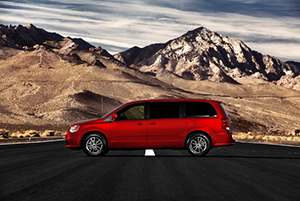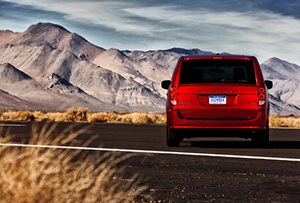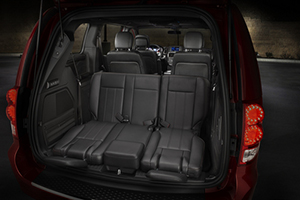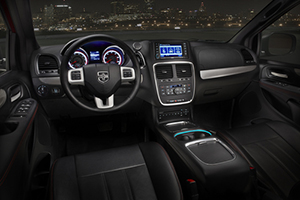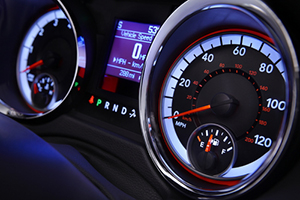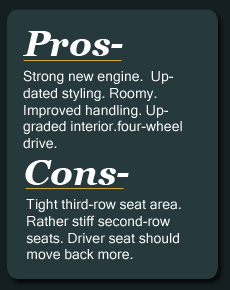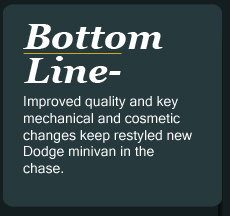2011 Dodge Grand Caravan
Dodge upgrades its 2011 Grand Caravan
minivan
Prices: $24,995-$30,595
Some thought SUVs and the newer car-based crossover vehicles would
eliminate minivans, but they remain too handy to die.
While the minivan market isn’t as big as it once was,
Dodge’s redone 2011 Grand Caravan minivan and
redesigned minivans from Toyota, Honda and Nissan show automakers have
confidence folks will continue to be drawn to minivans that provide
much-needed room and a carlike driving experience.
Dodge’s entries long led minivan sales, and this automaker
has made major improvements to its 2011 front-drive Grand Caravan model
to stay competitive with large Japanese rivals.
List prices for the roomy Grand Caravan range from $24,995 to $30,995.
It comes as the Express, Mainstreet, Crew and R/T models. I
tested the very well-equipped $28,695 Crew version.
Standard for the Express are a three-zone manual climate control, power
heated mirrors, industry exclusive “Stow n/
Go” seating, remote keyless entry, tilt/telescoping steering
column and a CD radio with six speakers.
Mainstreet features include power second-row windows and power
third-row vents, besides one-touch driver/passenger windows.
The Crew has power sliding doors, power driver seat, power adjustable
pedals, three-zone automatic temperature control and upgraded
sound system with a touchscreen, along with a ParkView rear backup
camera and new 17-inch aluminum wheels.
The R/T is for those who want superior handling and agility. It has
“exclusive” 17-inch wheels and a body color grille.
The all-black interior has black leather seats with red stitching,
leather-wrapped wheel and shift knob and a killer sound system with
nine speakers. It also has a performance-tuned suspension—but
no extra power.
Safety features for all include front side air bags, a new driver-side
knee blocker air bag, three-row side curtain air bags and remote
keyless entry.
Optional are a bunch of items including a DVD entertainment system,
heated front and second-row seats, power hatch, remote start,
ParkSense rear park assist system, ParkView rear backup camera,
Blind-Spot monitoring and Rear Cross Path detection system.
All Grand Caravans have a new direct-injection 3.6-liter
dual-overhead-camshaft V-6 with variable-valve timing. It
replaces the 2010 model’s 3.3, 3.8 and 4-liter V-6s.
The new engine has 283 horsepower and more torque than the previous
197-horsepower 3.8-liter V-6 without sacrificing fuel economy, although
the minivan’s approximately 4,500-pound weight can be felt
during fast acceleration. The engine is smoother than even the 4-liter
251-horsepower V-6. (The 3.3 was weak on highways with 175 horsepower.)
The hood is held open by an old-fashioned prop rod, but fluid filler
areas cam be easily reached.
Estimated fuel economy of the Crew model I tested was 17 mpg in the
city and 25 on highways. While 89 octane gasoline is recommended, 87
octane fuel is “acceptable.” Fuel tank capacity is
20 gallons.
The new engine works with an improved six-speed automatic transmission
with a new fuel economizer mode and an easily used manual-shift
feature. The short shift lever juts from the dashboard to save space.
The transmission is generally smooth but downshifts very abruptly when
the gas pedal is floored. That’s fine for sudden passing or
fast merging but gives a jerk to occupants.
The Grand Caravan is pretty quick on its feet because nearly every
major system in the suspension has been overhauled. The
steering, although a bit heavy, is quicker and more precise. And there
are returned front and rear springs and shocks and an increased rate
rear torsion beam axle and track bar bushing. There’s also a
lowered ride height with 16-inch tires.
Handling is carlike, and electronic stability and all-speed traction
control are standard. The ride is supple—thanks partly to a
long 121.2-inch wheelbase. The brake pedal has a nice firm feel and
brakes have an anti-lock feature.
A new front fascia, new hood and quad headlights give a more aggressive
look, although the low front end is susceptible to damage. A new, more
sculpted rear fascia and tailgate accompany new “ring of
fire” LED taillights. This minivan is pretty aerodynamic and
offers a new “Stow n’ Place” roof rack
system to allow roof bows to be stowed when not in use, resulting in
better aerodynamics.
A revamped commendably quiet interior has a much-needed more upscale
look, with better materials. A new one-piece instrument panel has
larger gauges and easily worked controls. And a new steering wheel with
integrated controls for audio, navigation and speed control offers a
minivan-first heated steering wheel option.
It takes a little extra effort to get in and out, but occupants sit
high with a good view of surroundings. However, the driver’s
seat should slide back more for long-legged motorists. Both front seats
could use more lateral support for spirited driving
The two console cupholders are conveniently placed and two
large sliding cover console storage areas in front of, and behind, the
cupholders in my test Grand Caravan were useful. Also, the
two-tier glove compartment has a fairly larger upper storage area.
Doors have pockets to store items and beverage containers.
I found the two center seats of the Grand Caravan I tested were rather
hard. The two third-row seats were mainly for children, although
shorter adults fit with reasonable comfort—at least for
shorter trips.
\
The Grand Caravan I tested had surprisingly good cargo room, even with
the third-row seats in place, and there was a lot more cargo room when
seatbacks were folded forward. Two interior indented areas help to
manually close the hatch, although I’d opt for the $425
power-operated hatch.
Volkswagen had a rear-drive minivan in the early 1950s, but the
Chrysler Group’s Dodge division offered the first modern
front-drive minivan some 27 years ago. It’s thus an old hand
at the minivan game, having, for instance, introduced 75 minivan-first
features over the past two decades.
As might be expected, the new Grand Caravan keeps improving
Dodge’s competitive position in the minivan field.

